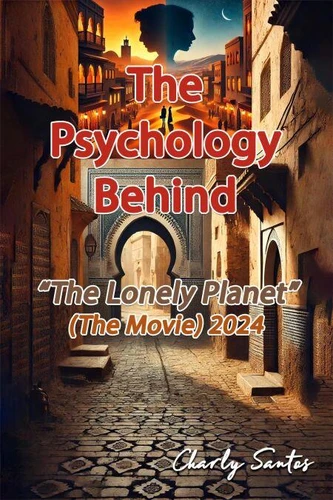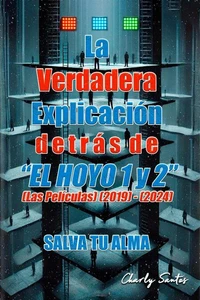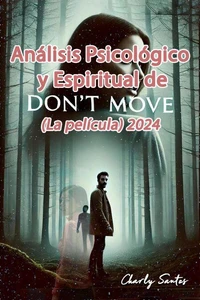The Psychology Behind “Lonely Planet” (The Movie) 2024
Par :Formats :
Disponible dans votre compte client Decitre ou Furet du Nord dès validation de votre commande. Le format ePub est :
- Compatible avec une lecture sur My Vivlio (smartphone, tablette, ordinateur)
- Compatible avec une lecture sur liseuses Vivlio
- Pour les liseuses autres que Vivlio, vous devez utiliser le logiciel Adobe Digital Edition. Non compatible avec la lecture sur les liseuses Kindle, Remarkable et Sony
 , qui est-ce ?
, qui est-ce ?Notre partenaire de plateforme de lecture numérique où vous retrouverez l'ensemble de vos ebooks gratuitement
Pour en savoir plus sur nos ebooks, consultez notre aide en ligne ici
- FormatePub
- ISBN8230437154
- EAN9798230437154
- Date de parution10/02/2025
- Protection num.pas de protection
- Infos supplémentairesepub
- ÉditeurIndependently Published
Résumé
The science of psychology applied to movies, TV shows, and anime profoundly impacts the viewer's psyche and soul, acting as a double-edged sword if its influence is not understood. If the viewer has unresolved psychological wounds, these may unconsciously reflect in the characters or situations presented in the media, reinforcing destructive patterns and perpetuating negative emotional and psychological cycles.
This can slow the process of self-understanding and healing, due to a phenomenon known as "negative priming, " where negative stimuli affect perception and behavior. True self-love, according to this perspective, is based on the balance of three pillars: psychological, physical, and spiritual. If the mind only follows the ego's desires, the body becomes dehumanized, creating internal conflicts and dysfunctional relationships that hinder genuine self-love.
This imbalance also affects the other two pillars, especially the spiritual and physical. This analysis offers a practical approach to understanding how hidden elements in media-such as scenes, dialogues, symbols, and colors-can negatively influence the viewer. However, by gaining knowledge and awareness of these patterns, the viewer can learn to reverse negative priming, achieving implicit healing and psychological liberation.
When understood, the truth behind images and messages in the media can contribute to healing and personal growth, as stated in the quote from Jesus: "the truth (psychological in movies) will set you free."This book will analyze, like no other, the psychology and spirituality behind Lonely Planet (2024). A film that explores the search for identity and maturity of Katherine, 56, and Owen, 34, who, during a writers' retreat in Morocco, face a challenge that exposes their lack of personal growth in profound areas.
This age-gap relationship reflects the complexities and prejudices surrounding intergenerational relationships. This time, it is an older woman paired with a man in his thirties.
This can slow the process of self-understanding and healing, due to a phenomenon known as "negative priming, " where negative stimuli affect perception and behavior. True self-love, according to this perspective, is based on the balance of three pillars: psychological, physical, and spiritual. If the mind only follows the ego's desires, the body becomes dehumanized, creating internal conflicts and dysfunctional relationships that hinder genuine self-love.
This imbalance also affects the other two pillars, especially the spiritual and physical. This analysis offers a practical approach to understanding how hidden elements in media-such as scenes, dialogues, symbols, and colors-can negatively influence the viewer. However, by gaining knowledge and awareness of these patterns, the viewer can learn to reverse negative priming, achieving implicit healing and psychological liberation.
When understood, the truth behind images and messages in the media can contribute to healing and personal growth, as stated in the quote from Jesus: "the truth (psychological in movies) will set you free."This book will analyze, like no other, the psychology and spirituality behind Lonely Planet (2024). A film that explores the search for identity and maturity of Katherine, 56, and Owen, 34, who, during a writers' retreat in Morocco, face a challenge that exposes their lack of personal growth in profound areas.
This age-gap relationship reflects the complexities and prejudices surrounding intergenerational relationships. This time, it is an older woman paired with a man in his thirties.
The science of psychology applied to movies, TV shows, and anime profoundly impacts the viewer's psyche and soul, acting as a double-edged sword if its influence is not understood. If the viewer has unresolved psychological wounds, these may unconsciously reflect in the characters or situations presented in the media, reinforcing destructive patterns and perpetuating negative emotional and psychological cycles.
This can slow the process of self-understanding and healing, due to a phenomenon known as "negative priming, " where negative stimuli affect perception and behavior. True self-love, according to this perspective, is based on the balance of three pillars: psychological, physical, and spiritual. If the mind only follows the ego's desires, the body becomes dehumanized, creating internal conflicts and dysfunctional relationships that hinder genuine self-love.
This imbalance also affects the other two pillars, especially the spiritual and physical. This analysis offers a practical approach to understanding how hidden elements in media-such as scenes, dialogues, symbols, and colors-can negatively influence the viewer. However, by gaining knowledge and awareness of these patterns, the viewer can learn to reverse negative priming, achieving implicit healing and psychological liberation.
When understood, the truth behind images and messages in the media can contribute to healing and personal growth, as stated in the quote from Jesus: "the truth (psychological in movies) will set you free."This book will analyze, like no other, the psychology and spirituality behind Lonely Planet (2024). A film that explores the search for identity and maturity of Katherine, 56, and Owen, 34, who, during a writers' retreat in Morocco, face a challenge that exposes their lack of personal growth in profound areas.
This age-gap relationship reflects the complexities and prejudices surrounding intergenerational relationships. This time, it is an older woman paired with a man in his thirties.
This can slow the process of self-understanding and healing, due to a phenomenon known as "negative priming, " where negative stimuli affect perception and behavior. True self-love, according to this perspective, is based on the balance of three pillars: psychological, physical, and spiritual. If the mind only follows the ego's desires, the body becomes dehumanized, creating internal conflicts and dysfunctional relationships that hinder genuine self-love.
This imbalance also affects the other two pillars, especially the spiritual and physical. This analysis offers a practical approach to understanding how hidden elements in media-such as scenes, dialogues, symbols, and colors-can negatively influence the viewer. However, by gaining knowledge and awareness of these patterns, the viewer can learn to reverse negative priming, achieving implicit healing and psychological liberation.
When understood, the truth behind images and messages in the media can contribute to healing and personal growth, as stated in the quote from Jesus: "the truth (psychological in movies) will set you free."This book will analyze, like no other, the psychology and spirituality behind Lonely Planet (2024). A film that explores the search for identity and maturity of Katherine, 56, and Owen, 34, who, during a writers' retreat in Morocco, face a challenge that exposes their lack of personal growth in profound areas.
This age-gap relationship reflects the complexities and prejudices surrounding intergenerational relationships. This time, it is an older woman paired with a man in his thirties.





